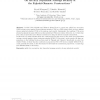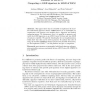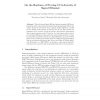115
click to vote
PKC
2016
Springer
9 years 10 months ago
2016
Springer
In the setting of secure multiparty computation, a set of mutually distrusting parties wish to securely compute a joint function. It is well known that if the communication model ...
PKC
2016
Springer
9 years 10 months ago
2016
Springer
Adaptively secure Multi-Party Computation (MPC) is an essential and fundamental notion in cryptography. In this work, we construct Universally Composable (UC) MPC protocols that ar...
PKC
2016
Springer
9 years 10 months ago
2016
Springer
In PKC 1999, Fujisaki and Okamoto showed how to convert any public key encryption (PKE) scheme secure against chosen plaintext attacks (CPA) to a PKE scheme which is secure against...
PKC
2016
Springer
9 years 10 months ago
2016
Springer
We present new frameworks for constructing public-key encryption schemes satisfying key-dependent message (KDM) security and that yield efficient, universally composable oblivious...
105
click to vote
PKC
2016
Springer
9 years 10 months ago
2016
Springer
We introduce delegatable functional signatures (DFS) which support the delegation of signing capabilities to another party, called the evaluator, with respect to a functionality F...
PKC
2016
Springer
9 years 10 months ago
2016
Springer
Abstract. This paper shows that it is feasible to implement the stateless hash-based signature scheme SPHINCS-256 on an embedded microprocessor with memory even smaller than a sign...
PKC
2016
Springer
9 years 10 months ago
2016
Springer
100
click to vote
PKC
2016
Springer
9 years 10 months ago
2016
Springer
The notion of extended nested dual system groups (ENDSG) was recently proposed by Hofheinz et al. [PKC 2015] for constructing almost-tight identity based encryptions (IBE) in the ...
PKC
2016
Springer
9 years 10 months ago
2016
Springer
The well-known Signed ElGamal scheme consists of ElGamal encryption with a non-interactive Schnorr proof of knowledge. While this scheme should be intuitively secure against chosen...
PKC
2016
Springer
9 years 10 months ago
2016
Springer
Functional encryption (FE) supports constrained decryption keys that allow decrypters to learn specific functions of encrypted messages. In numerous practical applications of FE, ...



